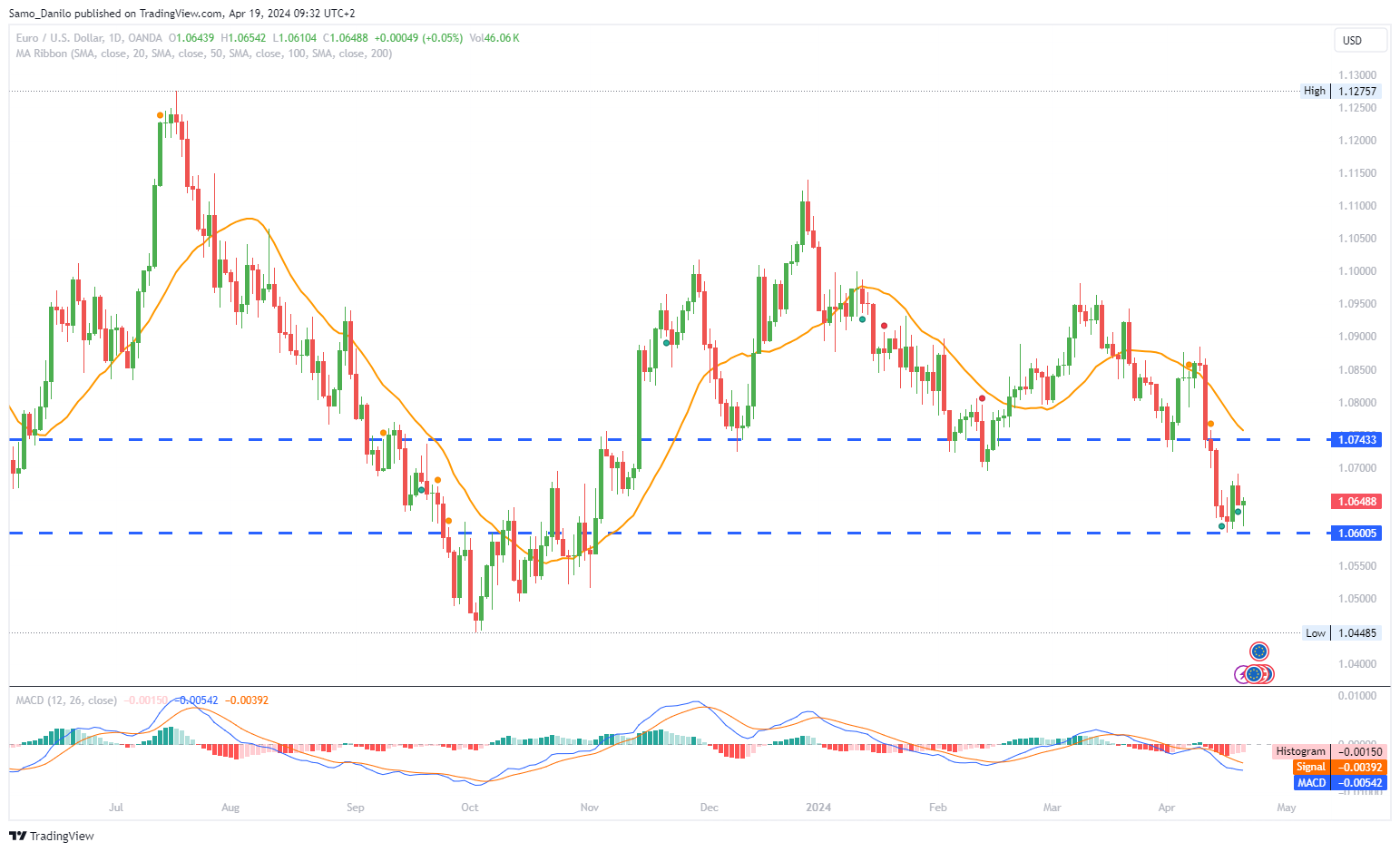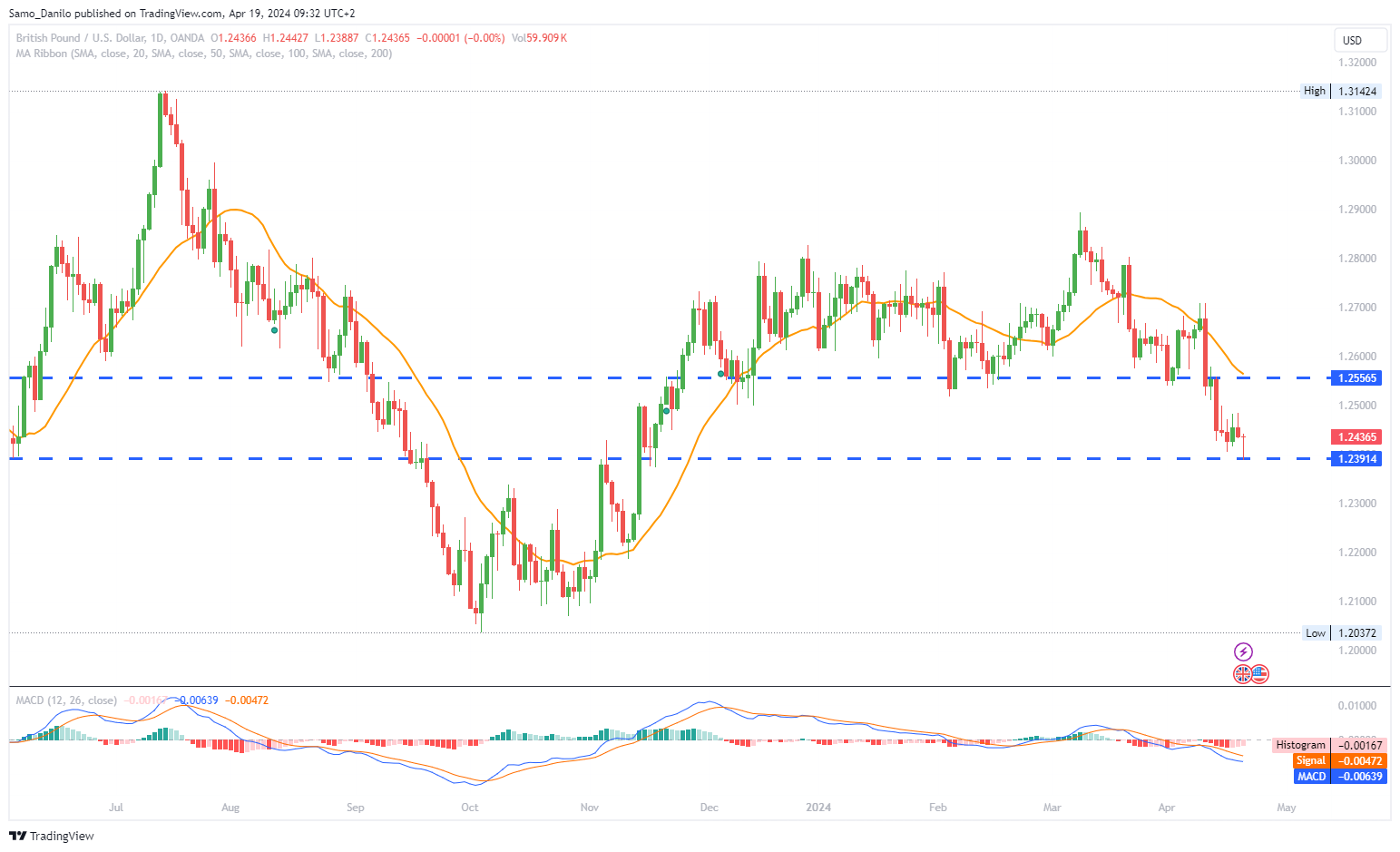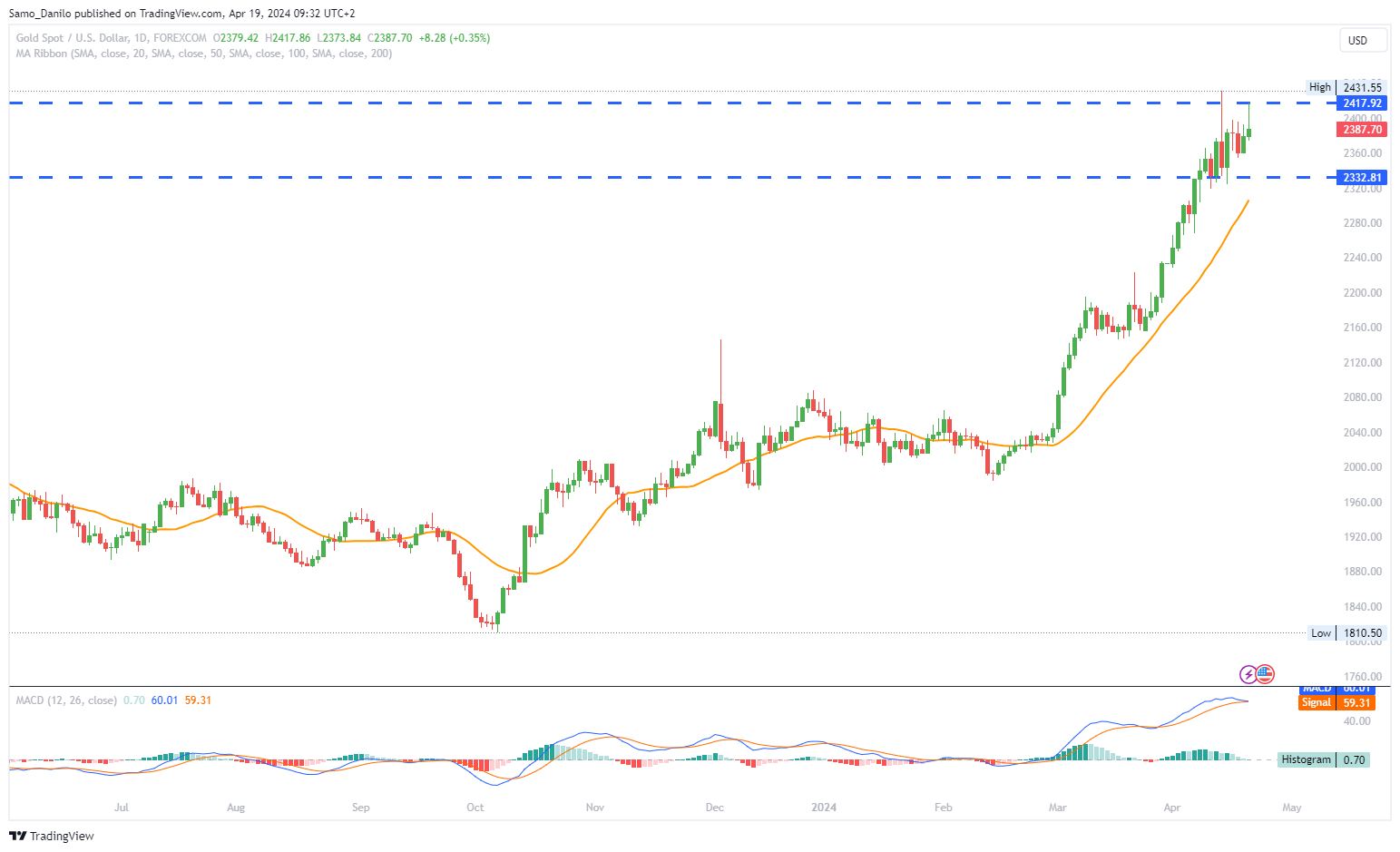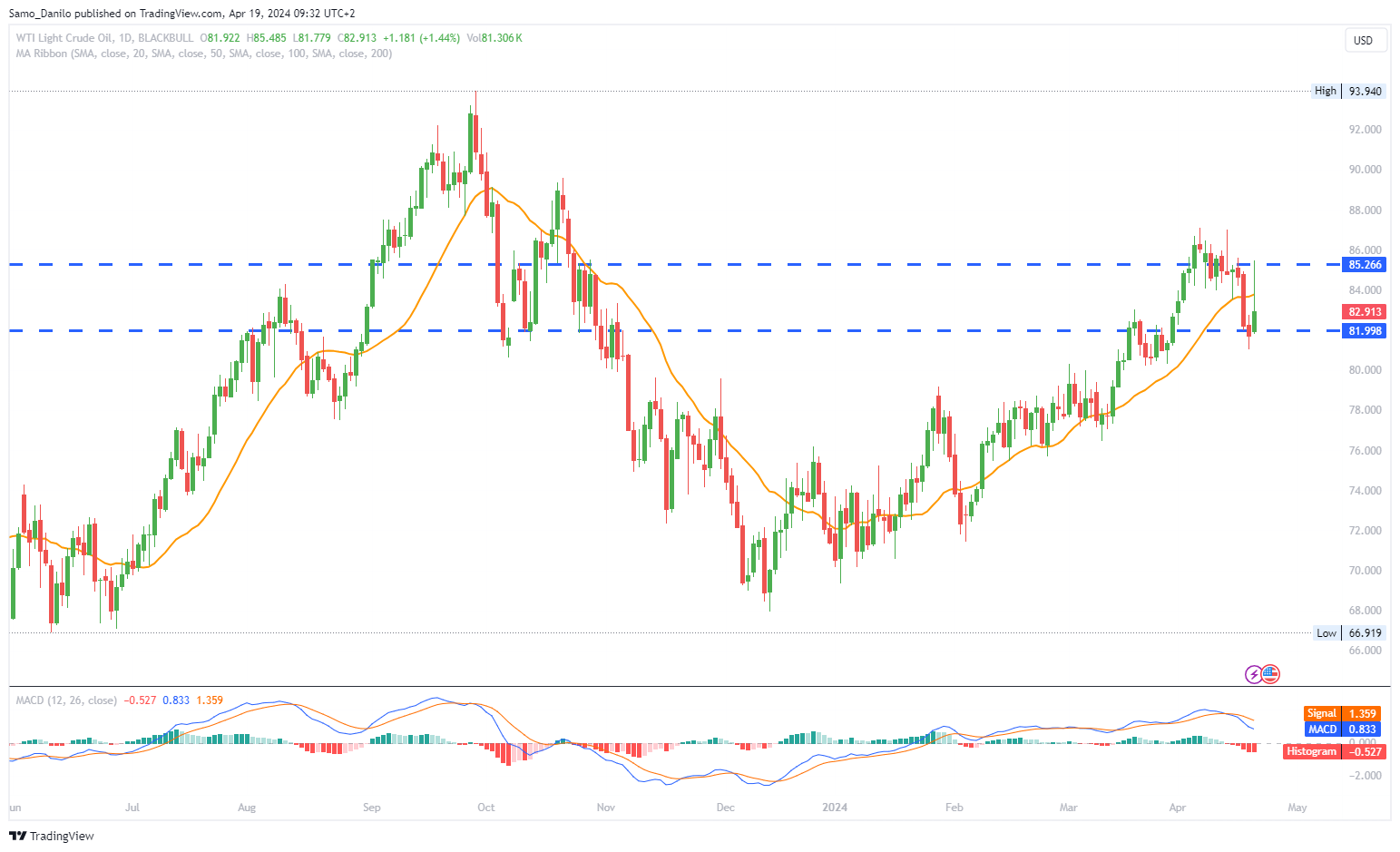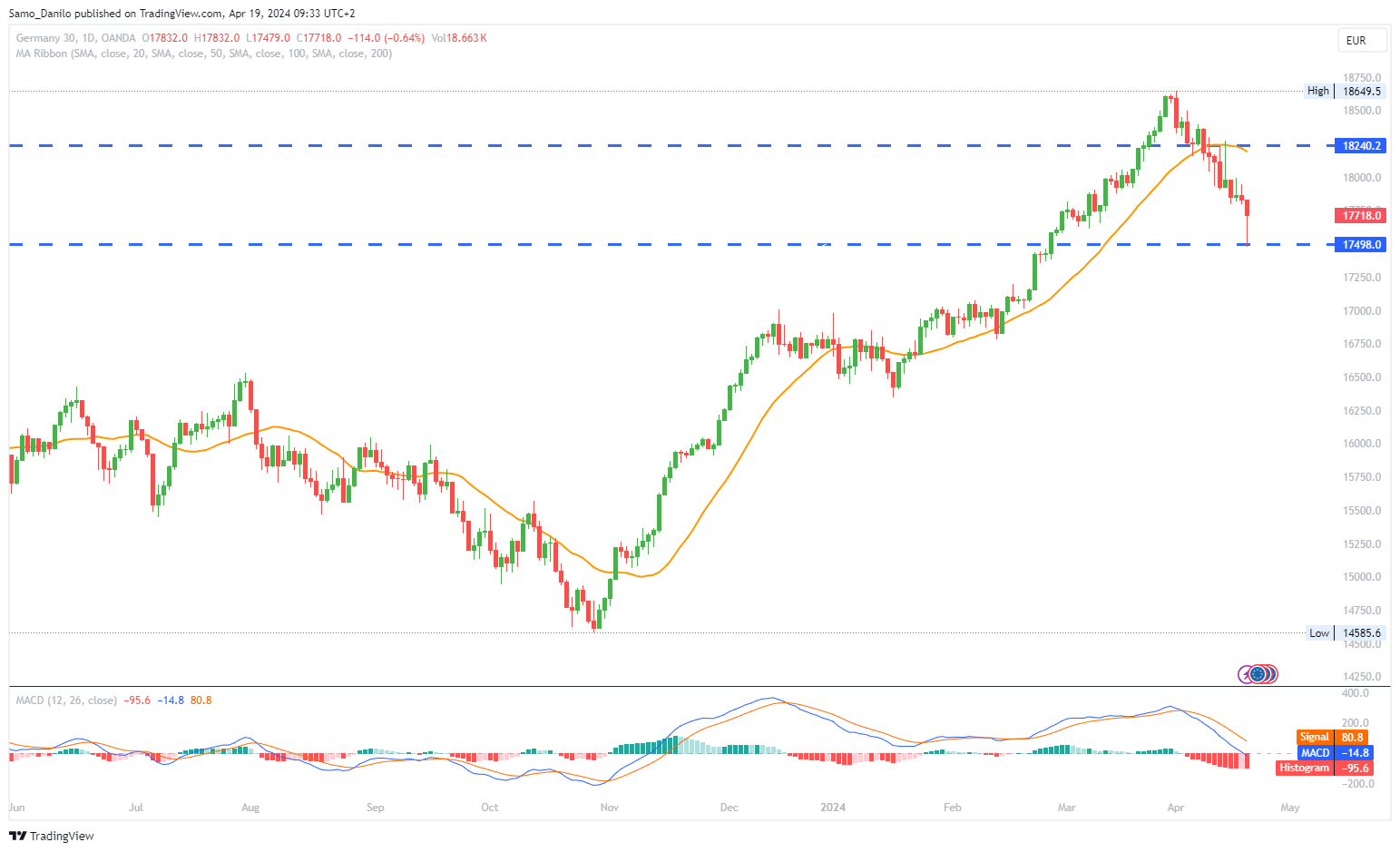EURUSD
- The EUR/USD pair continues its downward trajectory, hovering around 1.0640, after pulling back from weekly highs near 1.0690 observed on Friday.
- ECB Board member Villeroy, along with colleagues Simkus and Kazaks, have voiced support for rate cuts, indicating a potential shift in monetary policy at the upcoming ECB meeting.
- ECB Vice President Luis de Guindos hinted at readiness to adjust monetary policy if economic data aligns with expectations, suggesting a dovish stance from the central bank.
- Meanwhile, Fed's J. Williams from New York highlighted the Fed's reliance on positive economic data, emphasizing the strength of the economy and efforts to mitigate imbalances.
- The increase in new claims for unemployment benefits in the US may add pressure on the USD, influencing the EUR/USD pair's movement amid shifting monetary policy expectations.
Closing statement: The EUR/USD pair faces downward pressure as ECB officials signal support for rate cuts, contrasting with the Fed's focus on favourable economic data. With ECB Vice President Luis de Guindos hinting at potential policy adjustments and US unemployment claims rising, market participants remain attentive to evolving monetary policy dynamics and economic indicators, shaping the direction of the EUR/USD exchange rate.
GBPUSD
- GBP/USD remains under pressure, hovering near 1.2400, marking levels not seen in five months, as downward momentum persists.
- UK Retail Sales data for March disappointed, with a 0% month-over-month growth compared to expectations of 0.3%, according to the Office for National Statistics (ONS).
- External member of the Monetary Policy Committee, Megan Greene, suggested that the Bank of England (BoE) may not consider cutting the Bank Rate due to persistently high inflation, particularly in wages and services.
- Atlanta Fed President Raphael Bostic expressed concerns about elevated inflation levels, signaling that the Fed may not rush to cut rates, given the need to address inflationary pressures.
- New York Fed President John Williams emphasized the Fed's data-dependent approach and highlighted that monetary policy remains appropriate, indicating a reluctance to implement rate cuts in the near term.
| SMA (20) | Falling |
|
|
| RSI (14) | Slightly Falling |
| |
| MACD (12, 26, 9) | Falling |
|
|
Closing statement: GBP/USD faces downward pressure amid disappointing UK Retail Sales data and concerns about inflation. With BoE analyst Megan Greene suggesting a reluctance to cut rates due to high inflation, and Fed officials like Raphael Bostic and John Williams emphasizing a cautious approach to rate adjustments, market sentiment surrounding GBP/USD remains subdued, reflecting uncertainties related to monetary policy and economic fundamentals.
GOLD
- Gold price retreats to around $2,380 after hitting a five-day high of $2,418 earlier in the Asian session, signaling volatility in the precious metal's value. Tensions in the Middle East escalate following reports from ABC News confirming Israeli missile strikes on a site in Iran, driving uncertainty and safe-haven demand for gold.
- Atlanta Fed President Raphael Bostic warns of elevated US inflation levels, suggesting that the Federal Reserve still needs to make progress in addressing inflationary pressures.
- New York Fed President John Williams reaffirms the Fed's data-dependent approach to monetary policy and indicates no immediate plans for interest rate cuts, contributing to market uncertainty regarding future monetary policy actions.
- Heightened concerns about escalating clashes in the Middle East, particularly along Israel's northern border and ongoing tensions in Gaza, add to geopolitical uncertainties, further supporting gold's safe-haven appeal.
| SMA (20) | Rising |
|
|
| RSI (14) | Rising |
|
|
| MACD (12, 26, 9) | Rising |
|
|
Closing statement: Gold price volatility persists amid escalating geopolitical tensions in the Middle East, coupled with concerns about elevated US inflation levels. While Fed officials like Raphael Bostic and John Williams emphasize the need to address inflation, their commitment to a data-dependent approach and reluctance to cut interest rates immediately add to market uncertainty. Additionally, ongoing clashes in the Middle East contribute to the safe-haven appeal of gold, reflecting broader geopolitical risks impacting market sentiment.
CRUDE OIL
- Crude oil prices gain momentum amid escalating tensions between Israel and Iran following confirmed reports of Israeli missile strikes on a site in Iran, heightening geopolitical risks in the Middle East.
- Expectations that the US Federal Reserve will delay interest rate cuts until September could potentially limit the upside for West Texas Intermediate (WTI) crude oil prices, as delayed rate cuts may impact economic activity and oil demand.
- Crude oil losses are tempered by the resumption of US oil sanctions against Venezuela, signaling ongoing geopolitical tensions and uncertainties in the global oil market.
- The introduction of additional sanctions on Iran's oil industry by the US and its allies further adds to geopolitical uncertainties and supports oil prices amid supply concerns.
- Despite Friday's price gains, crude oil prices are poised for a weekly decline, reflecting overall market volatility and mixed factors influencing oil market dynamics.
| SMA (20) | Rising |
|
|
| RSI (14) | Falling |
|
|
| MACD (12, 26, 9) | Slightly Falling |
|
Closing statement: Crude oil prices experience a surge in trading activity driven by escalating tensions between Israel and Iran, compounded by geopolitical uncertainties surrounding US interest rate policies and ongoing oil sanctions against Venezuela and Iran. While geopolitical tensions and supply concerns support oil prices, market volatility and the prospect of a weekly decline underscore the complex dynamics influencing crude oil markets.
DAX
- Rising expectations of a June ECB interest rate cut fueled investor appetite for DAX-listed stocks, with ECB members expressing alignment in recent sessions, signaling potential monetary policy easing.
- Positive corporate earnings reports contributed to gains in the session, offsetting the absence of significant economic data releases from Germany or the Eurozone that could influence market sentiment.
- US jobless claims and the Philly Fed Manufacturing Index on Thursday supported optimism about the US economy's resilience, with initial jobless claims remaining unchanged and the Philly Fed Manufacturing Index unexpectedly increasing in April.
- German producer prices for March showed a smaller-than-expected decline, decreasing by 2.9% year-on-year, according to data from the federal statistics office. Analysts had anticipated a larger decline of 3.2%, suggesting some resilience in the German economy.
- Against the backdrop of mixed reports from the Middle East, investors are advised to closely monitor ECB commentary, especially as ECB President Christine Lagarde and Executive Board member Piero Cipollone attend the IMF/World Bank Spring Meetings. The potential implications of any escalation in the Middle East conflict also warrant careful consideration.
| SMA (20) | Rising |
|
|
| RSI (14) | Falling |
|
|
| MACD (12, 26, 9) | Falling |
|
|
Closing statement: Investor sentiment in the DAX remained buoyant, fueled by expectations of a June ECB interest rate cut and positive corporate earnings reports. Resilience in the US economy, as indicated by stable jobless claims and an unexpected increase in the Philly Fed Manufacturing Index, added further support. Despite concerns about geopolitical tensions in the Middle East, the DAX ended the session on a positive note, with investors keeping a close watch on ECB commentary and developments in the region.
